
This species has less convex whorls than the others in the genus and is unusual in lacking a seminal receptacle and in having a lobe at the base of the distal part of the penis. Also, the operculum has more pegs (3-5).
This is one of several species of Fluvidona found in northern New South Wales and southern Queensland. They are all very similar, being separated on small differences in size and shape of the shells and in anatomical details. They have elongate-conic shells with adults having a slightly thickened aperture and the operculum bears one or more pegs.
Fluvidona orphana Miller, Ponder & Clark, 1999
Class Gastropoda
Infraclass Caenogastropoda
Order Littorinida
Suborder Rissoidina
Superfamily Truncatelloidea
Family Tateidae
Original name: Fluvidona orphana Miller, Ponder & Clark, 1999. In Miller, A.C, Ponder, W.F. & Clark, S.A., 1999. Freshwater snails of the genera Fluvidona and Austropyrgus (Gastropoda, Hydrobiidae) from northern New South Wales and southern Queensland. Invertebrate Taxonomy 13: 461-493.
Type locality: Small creek, Sea Acres Reserve, Port Macquarie, New South Wales.
On palm fronds, leaves etc. in small stream, common to abundant. Assumed to feed by scraping bacteria and possibly microalgae. Presumed solitary capsules with single egg. Direct development.
Known from a single stream at Sea Acres Reserve, Port Macquarie, New South Wales.
Most species of Fluvidona are geographically isolated and have restricted ranges. This species is known from a small stream at Sea Acres Reserve, Port Macquarie.
Miller, A. C., Ponder, W. F. & Clark, S. A. (1999). Freshwater snails of the genera Fluvidona and Austropyrgus (Gastropoda, Hydrobiidae) from northern New South Wales and southern Queensland, Australia. Invertebrate Taxonomy 13: 461-493.